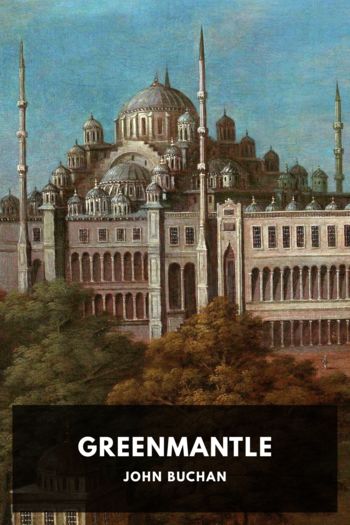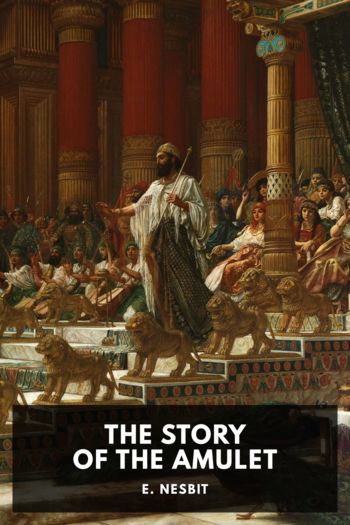Greenmantle, John Buchan [big screen ebook reader .TXT] 📗

- Author: John Buchan
Book online «Greenmantle, John Buchan [big screen ebook reader .TXT] 📗». Author John Buchan
Michael swore he had passed no one on the road.
“That fool Hannus has seen a ghost,” said the officer testily. “It’s too cold for this child’s play.”
Hannus, almost in tears, repeated his tale. “The man spoke to me in good German,” he cried.
“Ghost or no ghost he is safe enough up the road,” said the officer. “Kind God, that was a big one!” He stopped and stared at a shell-burst, for the bombardment from the east was growing fiercer.
They stood discussing the fire for a minute and presently moved off. Peter gave them two minutes’ law and then clambered back to the highway and set off along it at a run. The noise of the shelling and the wind, together with the thick darkness, made it safe to hurry.
He left the road at the first chance and took to the broken country. The ground was now rising towards a spur of the Palantuken, on the far slope of which were the Turkish trenches. The night had begun by being pretty nearly as black as pitch; even the smoke from the shell explosions, which is often visible in darkness, could not be seen. But as the wind blew the snow-clouds athwart the sky patches of stars came out. Peter had a compass, but he didn’t need to use it, for he had a kind of “feel” for landscape, a special sense which is born in savages and can only be acquired after long experience by the white man. I believe he could smell where the north lay. He had settled roughly which part of the line he would try, merely because of its nearness to the enemy. But he might see reason to vary this, and as he moved he began to think that the safest place was where the shelling was hottest. He didn’t like the notion, but it sounded sense.
Suddenly he began to puzzle over queer things in the ground, and, as he had never seen big guns before, it took him a moment to fix them. Presently one went off at his elbow with a roar like the Last Day. These were Austrian howitzers—nothing over eight-inch, I fancy, but to Peter they looked like leviathans. Here, too, he saw for the first time a big and quite recent shell-hole, for the Russian guns were searching out the position. He was so interested in it all that he poked his nose where he shouldn’t have been, and dropped plump into the pit behind a gun-emplacement.
Gunners all the world over are the same—shy people, who hide themselves in holes and hibernate and mortally dislike being detected.
A gruff voice cried “Wer da?” and a heavy hand seized his neck.
Peter was ready with his story. He belonged to Michael’s wagon-team and had been left behind. He wanted to be told the way to the sappers’ camp. He was very apologetic, not to say obsequious.
“It is one of those Prussian swine from the Marta bridge,” said a gunner. “Land him a kick to teach him sense. Bear to your right, mannikin, and you will find a road. And have a care when you get there, for the Russkoes are registering on it.”
Peter thanked them and bore off to the right. After that he kept a wary eye on the howitzers, and was thankful when he got out of their area on to the slopes up the hill. Here was the type of country that was familiar to him, and he defied any Turk or Boche to spot him among the scrub and boulders. He was getting on very well, when once more, close to his ear, came a sound like the crack of doom.
It was the field-guns now, and the sound of a field-gun close at hand is bad for the nerves if you aren’t expecting it. Peter thought he had been hit, and lay flat for a little to consider. Then he found the right explanation, and crawled forward very warily.
Presently he saw his first Russian shell. It dropped half a dozen yards to his right, making a great hole in the snow and sending up a mass of mixed earth, snow, and broken stones. Peter spat out the dirt and felt very solemn. You must remember that never in his life had he seen big shelling, and was now being landed in the thick of a first-class show without any preparation. He said he felt cold in his stomach, and very wishful to run away, if there had been anywhere to run to. But he kept on to the crest of the ridge, over which a big glow was broadening like sunrise. He tripped once over a wire, which he took for some kind of snare, and after that went very warily. By and by he got his face between two boulders and looked over into the true battlefield.
He told me it was exactly what the predikant used to say that Hell would be like. About fifty yards down the slope lay the Turkish trenches—they were dark against the snow, and now and then a black figure like a devil showed for an instant and disappeared. The Turks clearly expected an infantry attack, for they were sending up calcium rockets and Very flares. The Russians were battering their line and spraying all the hinterland, not with shrapnel, but with good, solid high-explosives. The place would be as bright as day for a moment, all smothered in a scurry of smoke and snow and debris, and then a black pall would fall on it, when only the thunder of the guns told of the battle.
Peter felt very sick. He had not believed there could be so much noise in the world, and the drums of his ears were splitting. Now, for a man to whom courage is habitual, the taste of fear—naked, utter fear—is a horrible thing.





Comments (0)